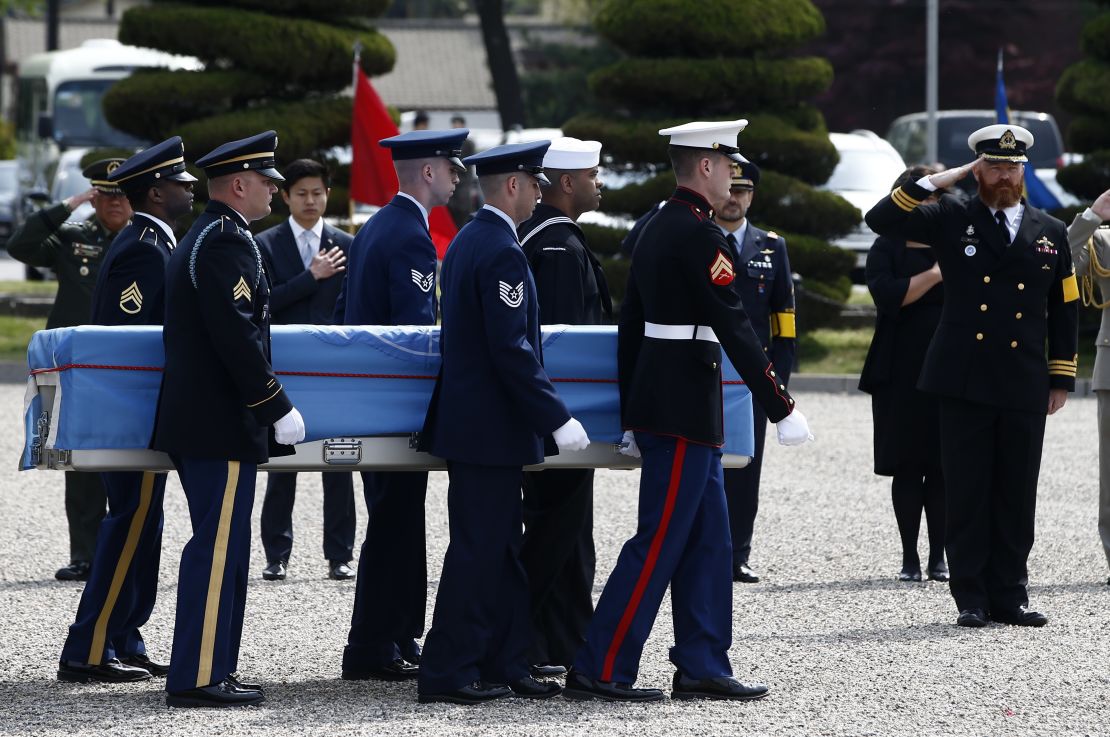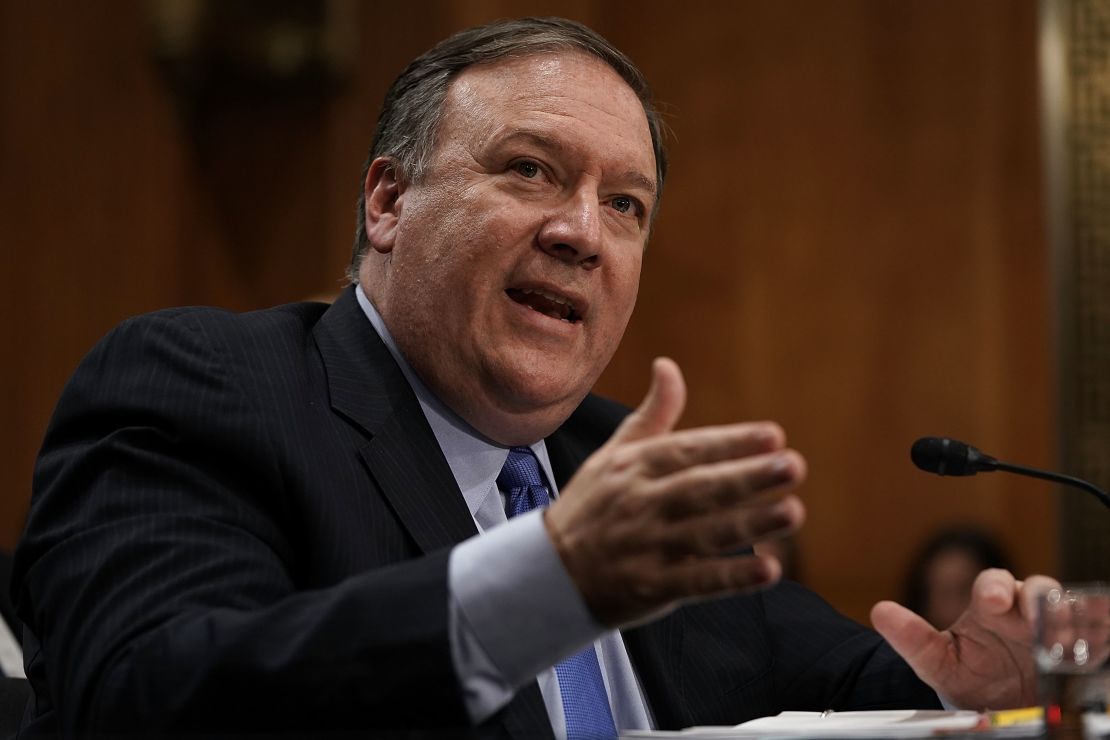It’s one of the four points listed in the joint statement US President Donald Trump and North Korea’s Kim Jong Un signed on June 12, the day of their historic meeting in Singapore.
“The United States and the DPRK commit to recovering POW/MIA remains, including the immediate repatriation of those already identified,” the document noted, referring to North Korea by its official name, the Democratic People’s Republic of Korea.
On Friday, the anniversary of the signing of another historic document – the armistice that ended the Korean War – North Korea handed over 55 sets of remains of what are believed to be American war dead.
The gesture has nothing to do with demands North Korea denuclearize, yet Pyongyang will consider its completion part of the deal that now puts the onus on Trump to begin alleviating some of North Korea’s economic and diplomatic pain.
“We are right where North Korea wants us to be,” said Duyeon Kim, an adjunct senior fellow at the Center for a New American Security.
“My concern is that once the remains are returned, which they should be, that the North’s demands will just increase because they could claim that they’ve finished half of the Singapore bargain,” she said.
The other requirement of North Korea, according to the document, is to work to denuclearize and the administration has repeatedly stated that Pyongyang must complete that process before sanctions are lifted, a point Secretary of State Mike Pompeo reinforced at the United Nations last week. With the recent dismantling of test sites, Pyongyang could argue it on its way to doing just that.
The White House welcomed the move from North Korea.
“Today, the Chairman is fulfilling part of the commitment he made to the President to return our fallen American service members,” the White House said in a statement. “We are encouraged by North Korea’s actions and the momentum for positive change.”
The other half of the bargain relates to normalizing relations between the two nations and a peace treaty. North Korea could essentially argue that before it can denuclearize it will need security guarantees, which the US committed to in the document. That could take the form of an actual peace treaty, which in turn could impact the presence of nearly 30,000 US troops in South Korea who are there as part of the UN command force maintaining the peace.
“Now it’s America’s turn to make a move. It could complicate negotiations because North Korea’s demands could increase exponentially,” Duyeon Kim told CNN.
North Korea’s possible power play could compel the White House to make good on some of its commitments, emboldening an already confident leader to push for greater concessions. Kim Jong Un’s leverage, with his nuclear arsenal, and allies like Russia and China loosening their own sanctions, may put the US in the uncomfortable position of having to acquiesce to Kim’s demands before any verifiable denuclearization takes place.
“What makes it more challenging this time around compared to other years is that North Korea is playing hardball to flip the order in which negotiations proceed,” Duyeon Kim said. “In the past it was: denuclearize first, and then you get the big stuff. Now, the North is trying to flip it by saying, give us normalization of relations, a peace treaty first, and then we’ll consider negotiating.”
This is one of the complications that arises when a non-nuclear demand is part of negotiations with North Korea, a regime long used to finding ways to subvert treaties and prolong moves to verify its promises.
Trump and his administration, said Duyeon Kim, will have to create new avenues of negotiation so the nuclear talks do not fall hostage to everything else that has become part of the conversation.
Recovered with American funds
They have been in North Korea for years, dozens of sets of remains believed to belong to American servicemen who died, were missing in action, or captured during the Korean War which ended in 1953.
Those remains were recovered with American funds, cash paid to the North Korean army, who deployed workers and peasants to scour battle sites looking for bones, tattered uniforms, or anything that might distinguish a Western corpse in fields where millions had died.
The remains – which have yet to be conclusively identified to be American – were meant to have been released to US officials after Kim Jong Un promised Trump he would do so in June. Their return was one of the very few clear actions in the Singapore communique; while the document spoke to North Korea’s need to denuclearize, there was no specificity or timeline included in the statement.
The repatriation of the remains has been repeatedly delayed. The North Koreans have canceled scheduled meetings with US counterparts to discuss the handover, even as US military transported 100 wooden boxes to the Demilitarized Zone to take delivery of the remains.
A visit by Pompeo earlier in July was largely seen as a botched trip, eliciting angry statements from the North Koreans, no meeting with Kim, and no remains for Pompeo to bring back to Washington.
Even at the eleventh hour, grumblings from North Korea persisted, as the regime prepared for the transfer.
On Wednesday, a source familiar with the repatriation plans told CNN’s Will Ripley that “the remains are ready to be handed over,” but the source also said the North Koreans “who collected the bodies are not happy because there is no reward for their hard work. In the past, the remains were not free.”
Thousands remain missing
There have been several repatriations over the years. In 1954, North Korea returned over 4,000 sets of remains. Between 1990 and 1994, North Korea turned over to the US 208 boxes of remains. Between 1996 and 2005, 220 sets of remains were returned. But there are still thousands of Americans lost in action during the war who have never been found.
Since 1993, the Defense Department has provided North Korea with nearly $28 million for assistance to recover the remains. Most of that money has gone to 32 joint field activities conducted in the North since 1996. Some 220 probable remains were recovered, Mark Manyin, a specialist in Asian affairs at the Foreign Affairs, Defense, and Trade Division said in a report for the Congressional Research Service in May 2005.

David Maxwell, a retired US Army Special Forces colonel who served five tours on the Korean Peninsula, said North Korea charges for every aspect of the recovery operations.
“North Korea plays on our culture, and our culture is ‘leave no service member behind.’ Every conflict of the modern era we have worked to recover the remains of Americans that are missing in action,” said Maxwell, currently a fellow at the Institute of Korean American Studies.
“They know that and of course they’ve played on that over the years. They’ve obtained a lot of cash from us for remains recovery, they charge us for every aspect of the operation, from the salaries to the tires on the vehicles, to the gas and the shovels. They probably charge us 10 to 20 times the value.”
The opposite of denuclearization
During a contentious hearing on Wednesday, Pompeo refused to share with lawmakers in the Senate Foreign Relations Committee any specifics Kim might have agreed to when he met with Trump.
“I’m not going to get into the private commitments that have been shared,” Pompeo said. “Remember where we were, right, so it all depends on what you draw as the projected line to say are we in a better place or a worse place than we would have been absent the Singapore.”
Trump has pointed to the absence of North Korean missile tests as good news while the two sides continue to meet and negotiate. At the same time, Pompeo admitted Wednesday that progress would be slow.
“I will concede that there is an awful long way to go. I am not trying to oversell the accomplishments that we have had toward the path of denuclearization to date, there is a great deal of work to do,” he said.

At the hearing, he also admitted that North Korea is continuing to produce weapons-grade fissile material.
For North Korea watchers like Maxwell, this is textbook Kim regime behavior.
“We have to manage and contain the situation until there is a fundamental change in Pyongyang,” he told CNN. “I don’t want to use the words game change, but as long as the Kim family regime is in power, they’re going to continue to act as they do.”
Even if backed into a corner by the return of the remains, Duyeon Kim believes the Trump administration should stay the course and negotiate.
“If Trump truly wants to make history, then he should press on with negotiations and make sure that a future nuclear deal is fully implemented before walking away and calling it quits,” she told CNN.
“We all want it to be quick, but it’s not going to be quick,” she said.
CNN’s Will Ripley, Barbara Starr and Zachary Cohen contributed to this report



